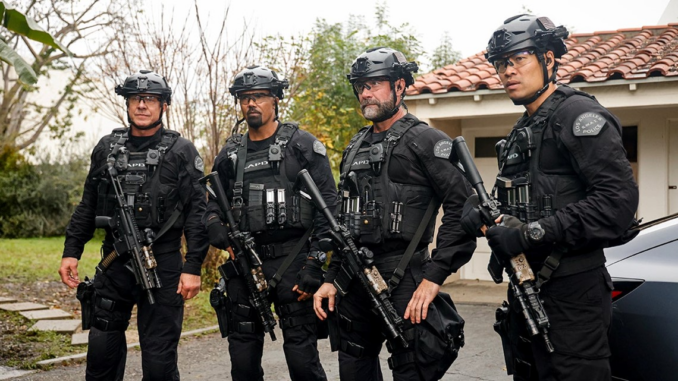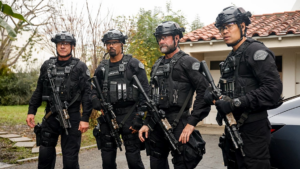
The popular police procedural drama S.W.A.T. has long been known for its action-packed storylines and strong characters. However, in recent seasons, the show has taken on a deeper, more socially conscious approach, tackling hot-button issues that reflect the complexities of today’s world. In an exclusive interview, S.W.A.T. co-creator Shawn Ryan opened up about why the series is shifting gears to explore topics like racial injustice, police reform, and community relations in a more nuanced light.
In this article, we dive into the reasons behind the show’s evolving storytelling and how S.W.A.T. is using its platform to shed light on critical issues facing society today.
A Shift Toward Deeper, More Relevant Storylines
For years, S.W.A.T. was primarily known for its high-octane action scenes, featuring tactical operations, intense standoffs, and daring rescues. However, as the show has progressed, it has increasingly incorporated thought-provoking storylines that explore current social issues. This shift in focus reflects a broader change in television, where audiences are demanding more than just entertainment—they’re seeking shows that engage with real-world problems.
Co-Creator’s Perspective on the Shift
In an exclusive interview, Shawn Ryan, the co-creator of S.W.A.T., explained the series’ decision to explore these important topics. “Television shows have always had a responsibility to reflect the world around them,” Ryan said. “As the show evolved, we wanted to ensure that S.W.A.T. wasn’t just a procedural drama, but also a series that could spark meaningful conversations about the issues that matter most to our audience.”
Ryan went on to explain that while S.W.A.T. remains committed to delivering the thrilling action fans expect, the show’s creators feel it’s important to address complex societal issues head-on. “We didn’t want to shy away from the conversations that are happening right now in America,” he said. “Whether it’s racial inequality or police reform, we believe that S.W.A.T. can be a platform for highlighting those issues in a meaningful and responsible way.”
Exploring Racial Injustice and Police Reform
One of the most significant shifts in S.W.A.T. has been the way it addresses issues of racial injustice and police reform—topics that have been front and center in public discourse over the past few years. Ryan emphasized that the show has made a conscious effort to present these issues in a way that reflects the real-life struggles faced by marginalized communities.
Tackling the Complicated Relationship Between Police and Community
In past seasons, the show has explored themes of systemic racism within law enforcement, with characters like Sergeant Daniel “Hondo” Harrelson, played by Shemar Moore, grappling with the complexities of being both a Black man and a police officer. The show has portrayed the challenges of navigating these dual identities and the strain they put on personal and professional relationships.
“It’s a delicate balance,” Ryan said. “We didn’t want to simplify the issue. We wanted to show the complexities of what it means to be part of a system that, at times, can be seen as oppressive. But we also wanted to show that there are people within that system who genuinely care about making a positive change.”

As Hondo and his team tackle dangerous situations on the streets of Los Angeles, their personal lives and relationships with the communities they serve are increasingly tested by the social dynamics at play. The portrayal of these issues on S.W.A.T. provides a much-needed conversation about race, power, and justice in modern-day America.
Creating Thoughtful, Nuanced Storylines
Unlike some shows that may handle social issues in a more sensationalized manner, S.W.A.T. takes a thoughtful and nuanced approach to the topics it tackles. The show’s writers and producers work hard to balance entertainment with responsibility, ensuring that the themes are explored authentically without undermining the characters or the plot.
A Commitment to Authentic Representation
For S.W.A.T., representation matters both on-screen and behind the scenes. Ryan highlighted the importance of bringing in diverse voices to ensure that the show’s portrayal of police work, race, and community is as authentic as possible. “We make sure that we have writers, producers, and consultants who can speak to these issues from lived experience,” Ryan said. “It’s essential to us that the stories we tell are grounded in reality and reflect the experiences of people who are directly impacted by the issues we address.”
This commitment to authenticity has helped S.W.A.T. resonate with audiences, many of whom see their own struggles reflected in the characters’ journeys. By including perspectives from a variety of backgrounds, the show has earned praise for its portrayal of both police officers and the communities they serve.
The Impact of S.W.A.T. on Its Audience
The decision to incorporate hot-button issues into the show has had a profound impact on S.W.A.T.’s audience. Many viewers have expressed appreciation for how the show uses its platform to foster important conversations about policing, race, and justice. On social media, fans frequently share how S.W.A.T. has opened their eyes to the challenges faced by police officers and marginalized communities alike.
A Source of Empowerment and Awareness
Some fans have even credited S.W.A.T. with helping them understand the complexities of modern-day policing. One fan shared, “I’ve learned so much from S.W.A.T. about the struggles that both officers and citizens face. The show has really made me think differently about these issues and sparked conversations in my own community.”
By engaging with these issues in a responsible way, S.W.A.T. has become more than just a crime drama—it has evolved into a platform for social change and awareness. The show’s ability to tackle tough subjects while still providing thrilling entertainment is one of the reasons it has continued to captivate audiences.
What’s Next for S.W.A.T. and Its Social Commentary?
Looking ahead, S.W.A.T. is poised to continue exploring relevant social issues in future seasons. Ryan shared that the team is always mindful of the world around them and that the show will remain flexible in addressing new topics as they arise. “We’re always watching the world and looking for ways to reflect what’s happening in real time,” Ryan explained. “We want to keep challenging ourselves and our audience to think about these important issues in new ways.”
The show is also exploring deeper character arcs that reflect the ongoing struggles and growth of its core team. “We’ve always said that S.W.A.T. is about the characters, not just the action,” Ryan said. “As long as we keep focusing on the human side of these stories, we’ll continue to tackle important issues in ways that resonate with our audience.”
Conclusion: A Show with Purpose and Impact
S.W.A.T. has made a bold move in recent seasons by tackling some of today’s most pressing issues, and the results speak for themselves. Through thoughtful storytelling and authentic representation, the show has opened up vital conversations about race, policing, and justice in America. Co-creator Shawn Ryan’s commitment to exploring these topics with sensitivity and nuance has allowed S.W.A.T. to evolve from a high-stakes procedural into a powerful platform for social commentary.
By addressing these hot-button issues head-on, S.W.A.T. is not only captivating its audience with thrilling action but also encouraging viewers to think critically about the world around them. As the series continues, it’s clear that S.W.A.T.will remain an important and influential show—one that balances entertainment with social responsibility.
FAQs
1. Why is S.W.A.T. focusing more on social issues in recent seasons?
The show’s creators felt a responsibility to reflect real-world issues, such as racial injustice and police reform, in a way that sparks meaningful conversations among its audience.
2. How does S.W.A.T. portray racial issues and police reform?
S.W.A.T. explores the challenges of being a police officer in a system that sometimes contributes to racial inequality. Characters like Hondo are shown grappling with their role in the system and striving for positive change.
3. Is S.W.A.T.’s approach to social issues effective in reaching its audience?
Many viewers have praised the show for its nuanced and thoughtful portrayal of complex issues, saying it helps them better understand the struggles faced by both police officers and marginalized communities.
4. Will S.W.A.T. continue to tackle these issues in future seasons?
Yes, the show’s creators have expressed a commitment to addressing relevant social issues as they arise, ensuring that the series continues to evolve and reflect the world around it.
5. What makes S.W.A.T. different from other crime dramas?
S.W.A.T. stands out for its ability to combine thrilling action with social commentary. The show’s focus on character development and its thoughtful exploration of real-world issues set it apart from typical procedural dramas.